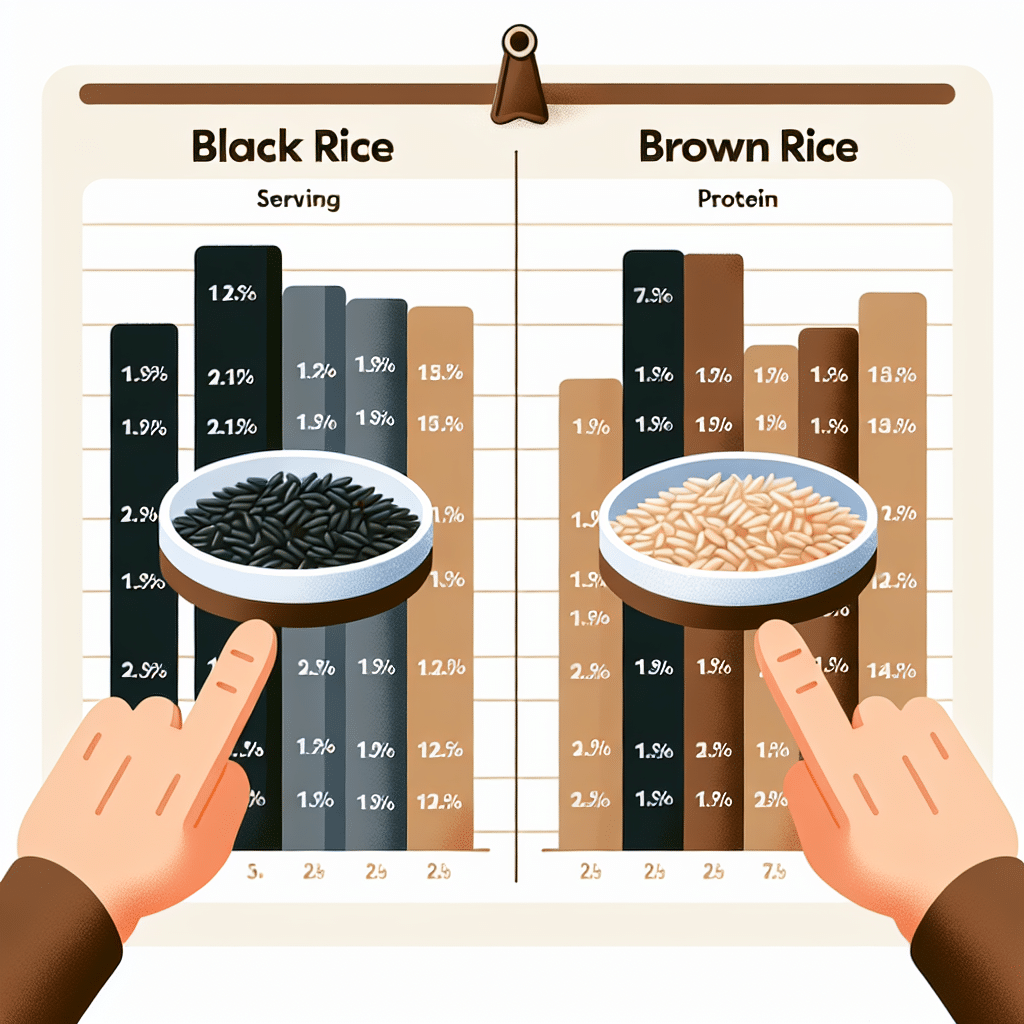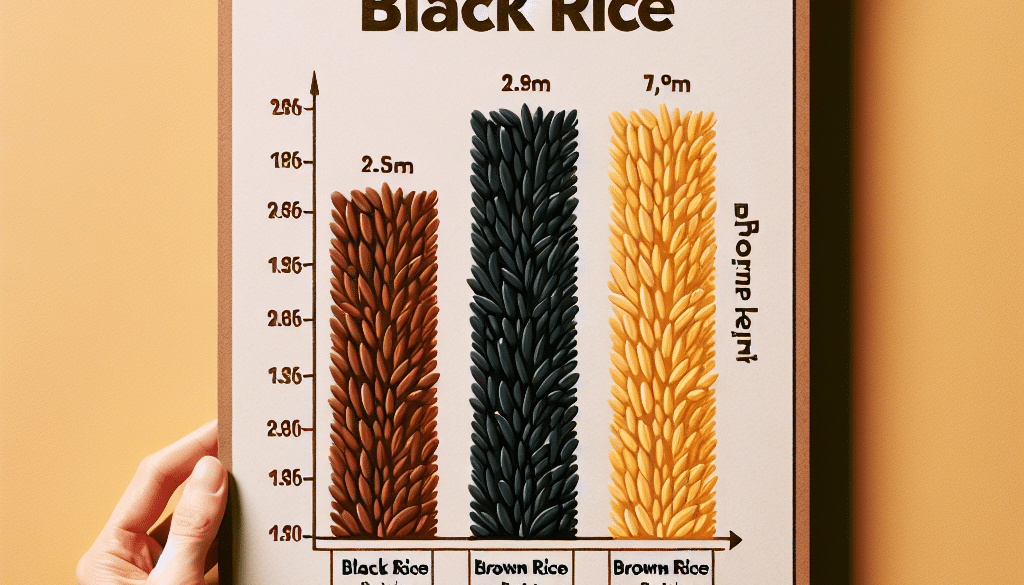Does black rice have more protein than brown rice?
-
Table of Contents
- Black Rice vs. Brown Rice: A Protein Comparison
- Nutritional Overview of Black Rice
- Nutritional Overview of Brown Rice
- Protein Content: Black Rice vs. Brown Rice
- Other Nutritional Considerations
- Health Benefits and Uses
- Case Studies and Research
- Conclusion: A Balanced Perspective on Rice and Protein
- Explore ETprotein’s High-Quality Protein Products
Black Rice vs. Brown Rice: A Protein Comparison

When it comes to choosing healthy grains, rice is a staple that often comes to mind. Among the various types, black rice and brown rice stand out for their nutritional benefits. But one question that health-conscious consumers frequently ask is: does black rice have more protein than brown rice? This article delves into the nutritional profiles of both rice varieties, with a focus on their protein content, to provide a comprehensive answer.
Nutritional Overview of Black Rice
Black rice, also known as ‘forbidden rice’, is a highly nutritious grain with a striking dark color that is rich in antioxidants. It is known for its high content of anthocyanins, the same type of antioxidants found in dark berries, which give it its distinctive color. Black rice has a nutty flavor and is often used in Asian cuisine, both in savory and sweet dishes.
Nutritional Overview of Brown Rice
Brown rice is a whole grain that has only had its outer husk removed, retaining its nutrient-rich bran and germ. It is a good source of magnesium, phosphorus, selenium, thiamine, niacin, and vitamin B6, and is high in fiber. Brown rice has a chewy texture and a mild, nutty flavor, making it a versatile ingredient in a variety of dishes.
Protein Content: Black Rice vs. Brown Rice
When it comes to protein content, both black rice and brown rice offer valuable amounts that contribute to daily dietary needs. However, the difference in protein content between the two is minimal. On average, a 100-gram serving of cooked black rice contains approximately 3.5 to 4 grams of protein, while the same serving of cooked brown rice provides about 2.5 to 3 grams of protein. While black rice does have a slightly higher protein content, the difference is not significant enough to categorize one as a superior protein source over the other.
Other Nutritional Considerations
While protein content is an important factor, it’s also essential to consider the overall nutritional profile of these grains. Here are some additional nutritional aspects of black and brown rice:
- Fiber: Both black and brown rice are good sources of dietary fiber, which is beneficial for digestive health. Black rice tends to have a slightly higher fiber content.
- Antioxidants: Black rice is rich in anthocyanins, which have been linked to various health benefits, including reduced inflammation and protection against chronic diseases.
- Minerals: Both types of rice contain essential minerals, but brown rice typically has higher amounts of magnesium and selenium.
- Vitamins: Brown rice is a good source of B vitamins, which are crucial for energy metabolism and maintaining healthy skin and hair.
Health Benefits and Uses
Both black and brown rice offer a range of health benefits due to their nutrient-rich profiles. They can be used interchangeably in recipes, depending on personal preference and desired nutritional benefits. Here are some health benefits associated with each type of rice:
- Black Rice: Its high antioxidant content may help protect against heart disease, cancer, and other chronic conditions. It’s also gluten-free and can be a good option for those with celiac disease or gluten sensitivity.
- Brown Rice: The high fiber content can aid in weight management by promoting satiety. It also helps maintain healthy blood sugar levels, making it a suitable choice for individuals with diabetes.
Case Studies and Research
Several studies have compared the nutritional benefits of different rice varieties. For instance, a study published in the Journal of Agricultural and Food Chemistry found that black rice has higher amounts of phenolic compounds and antioxidant activity compared to brown rice. However, when it comes to protein content, research indicates that the differences between black and brown rice are relatively minor.
Conclusion: A Balanced Perspective on Rice and Protein
In conclusion, while black rice does contain slightly more protein than brown rice, the difference is not substantial. Both grains are nutritious options that can contribute to a balanced diet. When choosing between black and brown rice, it may be more beneficial to consider other nutritional factors and personal health goals.
For those looking to increase their protein intake, it’s important to include a variety of protein-rich foods in the diet. Rice can be part of this balanced approach, but it should be complemented with other protein sources such as legumes, nuts, seeds, dairy, or lean meats.
Explore ETprotein’s High-Quality Protein Products
If you’re seeking additional protein sources to enhance your diet, consider exploring ETprotein’s range of organic and vegan protein products. Their offerings include high-quality rice protein, pea protein, and other plant-based proteins that are non-GMO and allergen-free. These products can be a great addition to your nutritional regimen, whether you’re looking to support your fitness goals, manage your weight, or simply maintain a healthy lifestyle.
About ETprotein:
ETprotein, a reputable protein and L-(+)-Ergothioneine (EGT) Chinese factory manufacturer and supplier, is renowned for producing, stocking, exporting, and delivering the highest quality organic bulk vegan proteins and L-(+)-Ergothioneine. They include Organic rice protein, clear rice protein, pea protein, clear pea protein, watermelon seed protein, pumpkin seed protein, sunflower seed protein, mung bean protein, peanut protein, and L-(+)-Ergothioneine EGT Pharmaceutical grade, L-(+)-Ergothioneine EGT food grade, L-(+)-Ergothioneine EGT cosmetic grade, L-(+)-Ergothioneine EGT reference grade and L-(+)-Ergothioneine EGT standard. Their offerings, characterized by a neutral taste, non-GMO, allergen-free attributes, with L-(+)-Ergothioneine purity over 98%, 99%, cater to a diverse range of industries. They serve nutraceutical, pharmaceutical, cosmeceutical, veterinary, as well as food and beverage finished product distributors, traders, and manufacturers across Europe, USA, Canada, Australia, Thailand, Japan, Korea, Brazil, and Chile, among others.
ETprotein specialization includes exporting and delivering tailor-made protein powder and finished nutritional supplements. Their extensive product range covers sectors like Food and Beverage, Sports Nutrition, Weight Management, Dietary Supplements, Health and Wellness Products, and Infant Formula, ensuring comprehensive solutions to meet all your protein needs.
As a trusted company by leading global food and beverage brands and Fortune 500 companies, ETprotein reinforces China’s reputation in the global arena. For more information or to sample their products, please contact them and email sales(at)ETprotein.com today.












